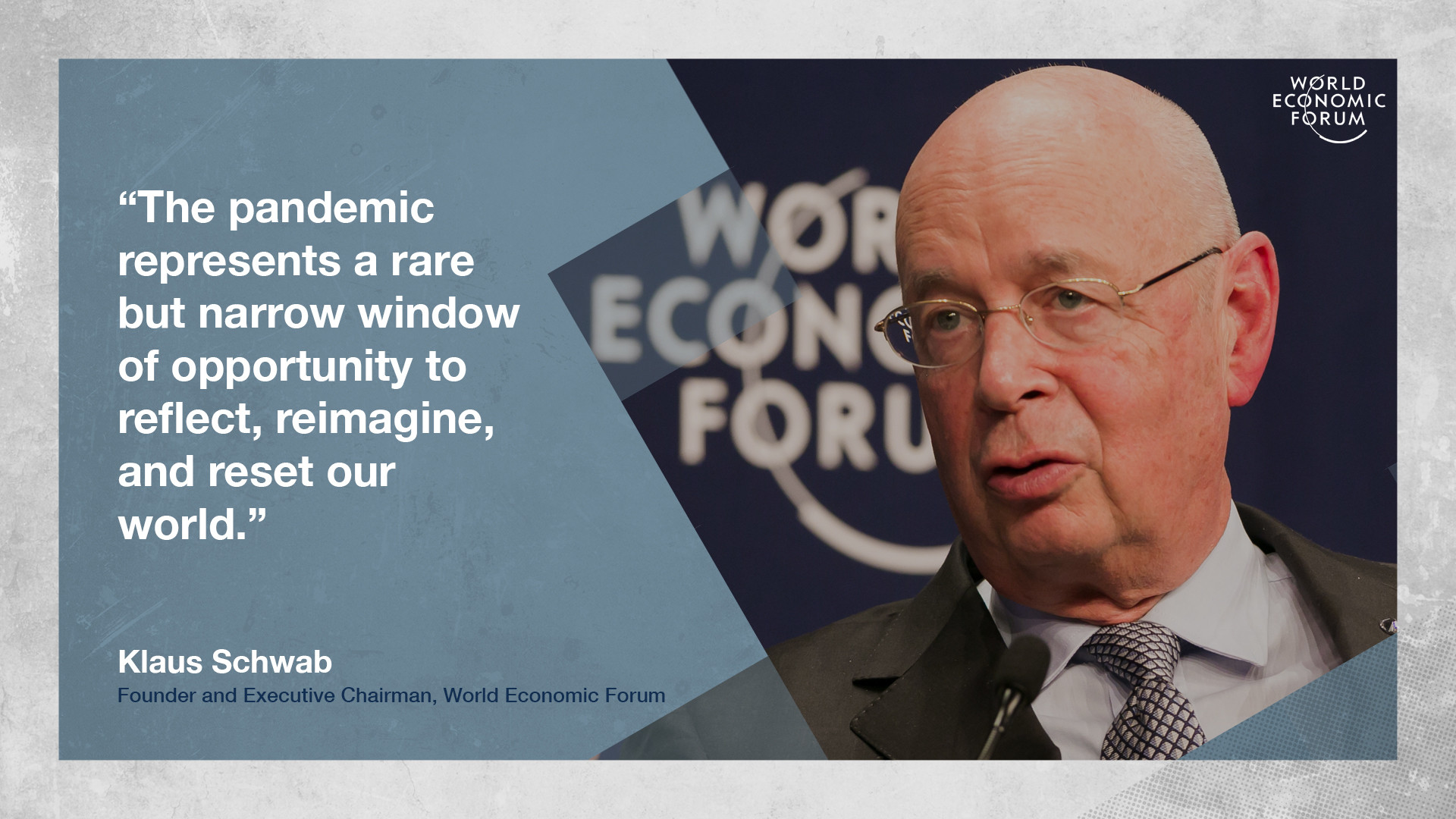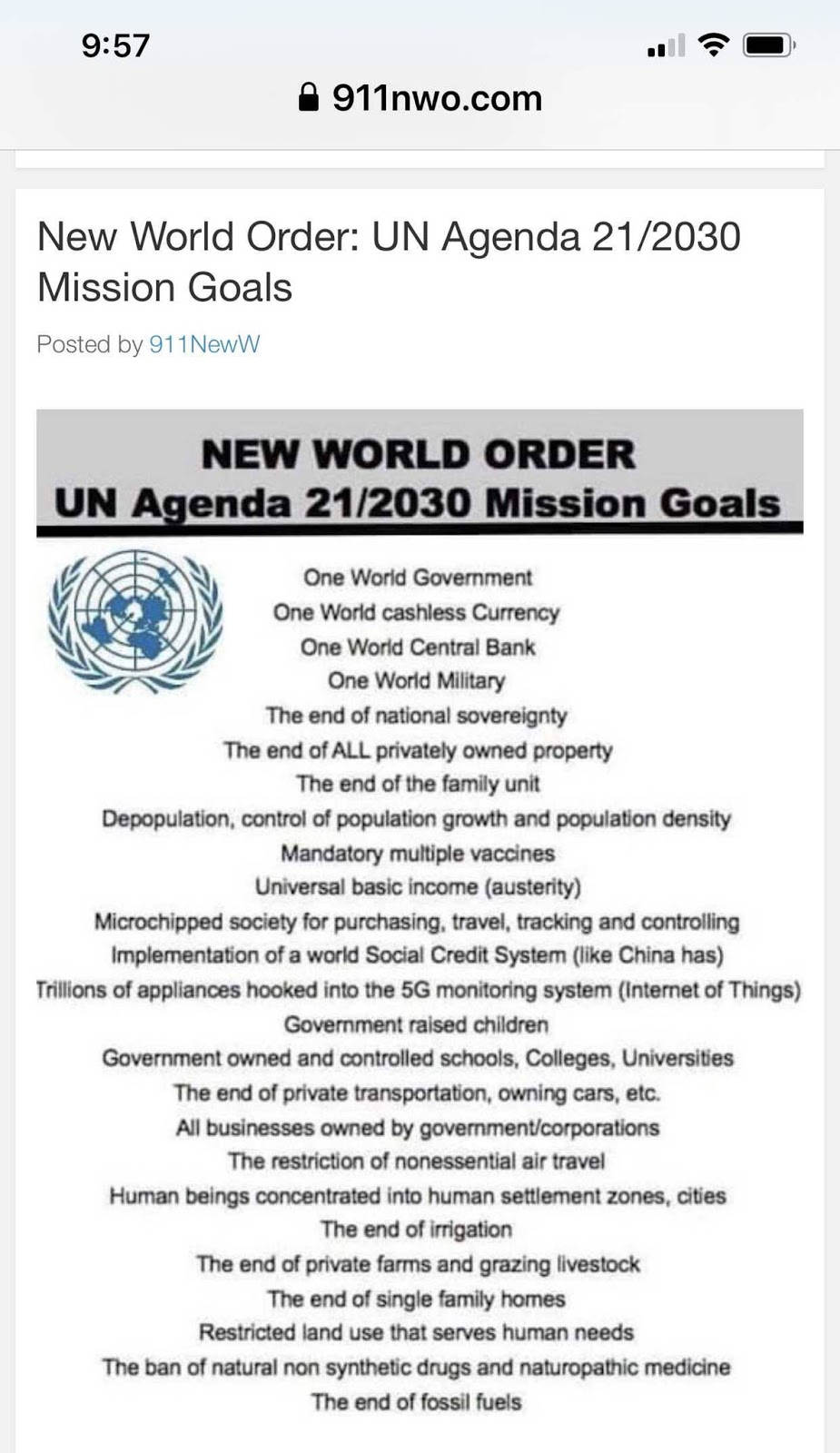Plandemic is a Globalist Ruse - "The Worst is Yet to Come"
September 5, 2020

"Whether it be in the name of Agenda 2030 etc.
it would amount to largely the same outcome
- the subjugation once and for all of national sovereignty
where the nation-state is subordinate to global governance."
Thoughts on Covid-19: The Great Reset, by Klaus Schwab and Thierry Malleret
by Steven Guinness
(abridged by henrymakow.com)
Shortly after the World Economic Forum launched their 'Great Reset' initiative, a new book titled, 'Covid-19: The Great Reset', authored by senior executives Klaus Schwab and Thierry Malleret ensued.
As touched upon in my last article, there are 5 planks to the Great Reset - economic, societal, geopolitical, environmental and technological - all of which the book covers in detail. But I want to focus largely on the conclusion, as it is here where the author's motivations and rationale for championing a Great Reset, in the wake of Covid-19, become clearer.
Schwab and Malleret characterize the future direction of the world as 'The Post Pandemic Era', a phrase that is repeated ad nauseam throughout. Rather than define it to a particular outcome, the authors opt instead to ask whether this new era will be marked by more or less cooperation between nations. Will countries turn inward resulting in the growth of nationalism and protectionism, or will they sacrifice their own interests for greater interdependence? ...
NO RETURN TO NORMALITY
One thing the authors do write on from a position of clarity is that never can the world return to normal. Or more to the point, be allowed to return to normal. Their view is that before Covid-19 took hold, a 'broken sense of normalcy prevailed'. The situation now is that the virus 'marks a fundamental inflection point in our global trajectory.' In a very short space of time it 'magnified the fault lines that beset our economies and societies'.
If it was not already obvious, then the authors confirm over the last few pages of the book that the United Nations' Agenda 2030 Sustainable Development program is intertwined with the Great Reset. This is evident when studying the WEF's Strategic Intelligence unit. Sustainable Development and the Great Reset go hand in hand.
For Agenda 2030 to be implemented successfully, Schwab and Malleret offer an alternative to the possibility of countries failing to come together. As you might expect, it revolves around collaboration and cooperation. In their eyes, no progress can otherwise be made. Covid-19 offers the opportunity to 'embed greater societal equality and sustainability into the recovery'. And, crucially, this would 'accelerate rather than delay progress towards 2030 Sustainable Development Goals'.

But it does not end simply with the full implementation of Agenda 2030. Schwab and Malleret want to go further. Their aim is that the open exposure of weaknesses within existing global infrastructure 'may compel us to act faster by replacing failed institutions, processes, and rules with new ones that are better suited to current and future needs.'
To convey the importance of this statement, the authors state that this alone is 'the essence of the Great Reset'. What they appear to be seeking is global transformation where systems & the age of the algorithm take precedent over political institutions. We are already beginning to see moves by major global institutions like the Trilateral Commission, the World Trade Organisation and the European Union to 'reform' & 'rejuvenate' both their work & membership. Covid-19 has undoubtedly straightened the hand of global planners and their quest for reformation.
As 'Covid-19: The Great Reset' was published, it was accompanied by an article written by Schwab and Malleret. Called, 'COVID-19's legacy: This is how to get the Great Reset right', they stated plainly that not only will a lot of things change forever, 'the worst of the pandemic is yet to come':
We will be dealing with its fallout for years, and many things will change forever. It has wrought (and will continue to do so) economic disruption of monumental proportions.
Indeed, no industry or business will be able to avoid the impact of the changes ahead. Either they adapt to fit in with the Great Reset agenda (assuming they have the resources to do so), or they will not survive. According to Schwab & Malleret, 'millions of companies risk disappearing', whilst only 'a few' e.g. corporate monoliths, will be strong enough to withstand the disruption. It is your smaller companies and independent run businesses that are faced with ruin, opening the door to a new era of mergers and acquisitions that will further erode consumer choice & competition.
SCAMDEMIC
Schwab and Malleret tell us that the worst of the pandemic is yet to come, and from an economic standpoint, I would not doubt them. But let's look at the health aspect for a moment. Global media coverage of Covid-19 has characterized it as a deadly virus that kills with impunity, and without the antidote of a vaccine could devour communities whole.
Perhaps surprisingly, the authors offer up a little fact-based logic. They admit that Covid-19 is 'one of the least deadly pandemics in the last 2000 years', and barring something unforeseen 'the consequences of the virus will be mild compared to previous pandemics.' At the time the book was published, 0.006% of the global population were reported to have died from Covid-19. But even this low figure is not altogether accurate.
In the UK for instance the way the death rate has been calculated has meant that people who have been diagnosed with the virus and then succumbed to an accident within 28 days of being tested will have their cause of death marked as Covid-19.
To quote Professor Yoon Loke, from the University of East Anglia, and Professor Carl Heneghan, from Oxford University:
Anyone who has tested COVID positive but subsequently died at a later date of any cause will be included on the PHE COVID death figures.
Schwab and Malleret could not be clearer when they write that Covid-19 'does not constitute an existential threat or a shock that will leave its imprint on the world's population for decades'. As it stands the Spanish Flu and HIV/AIDS have a larger mortality rate.
It was not an uncontrollable spread of Covid-19 that caused governments around the world to shut down their national economies, but the data modelling of unaccountable technocrats like Neil Ferguson of Imperial College London that predicted hundreds of thousands of people were at immediate risk of dying without the imposition of social restrictions, which we now know to be a combination of social distancing and lockdown measures.
When Schwab and Malleret talk about Covid-19 leaving its imprint on the world, the truth of the matter is that it is the measures imposed in the name of Covid-19 that have caused widespread economic destruction, not the virus itself. That distinction is one that mainstream outlets in particular refuse to engage with.

CONCLUSION
In summary, if we are to take the authors at their word, then they see a rise in nationalism and protectionism off the back of Covid-19 as a detriment to the quest for a Great Reset. The much-coveted Sustainable Development Goals could even be at risk should nations turn inward. IMF Managing Director has said the world has a choice between the Great Reset or the Great Reversal (the Great Reversal being 'more poverty, more fragmentation, and less trade') I would argue that there is another way of looking at it...
The scale of change that globalists are calling for through the vehicle of a Great Reset, which by definition is global in nature, will in my view require the implosion of the current world order to lay the foundations for new world order. The old must make way for the new. And the one method for how that could be achieved is through increased kickback against interdependence.
Sustained crises offer many opportunities for global planners. The potential for a contested U.S. election, an upcoming no-deal Brexit & warnings of 'vaccine nationalism' are three eventualities that if brought to bear could be exploited and used to advance the cause for a Great Reset. I would say that the further the world appears from collaboration and cooperation, the more people are going to call for those very same things if they become increasingly desperate...
...As yet there is not a widespread clamoring for change. But that time is coming. Whether it be in the name of Agenda 2030 (aka Sustainable Development), The Green New Deal or The Great Reset, it would amount to largely the same outcome - the subjugation once and for all of national sovereignty where the nation-state is subordinate to global governance.






